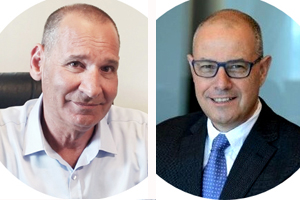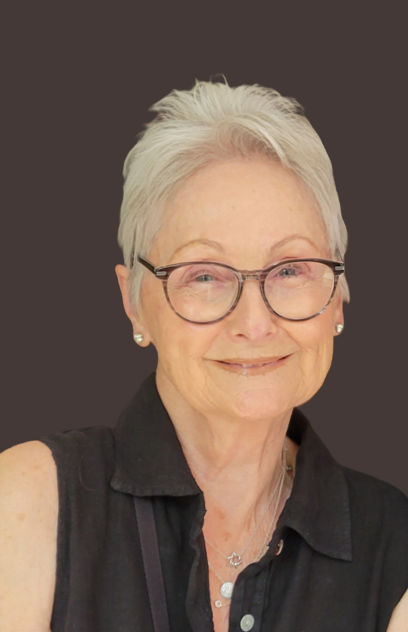Features
New Israeli company launches on Canadian Stock Exchange in 2019 and hopes to attract more Canadian investors

By BERNIE BELLAN
In January of this year I was contacted by an old friend who has specialized in bringing small companies to market. I was asked whether I was aware how many small Israeli companies have been launching Initial Public Offerings on various Canadian stock exchanges, especially the Venture Exchange of the Toronto Stock Exchange (TSX-V) in recent years?
I responded that I had heard from time to time of Israeli companies coming to Canada seeking investors and that I was always interested in learning more.
I was then told that one such company, known as Water Ways, would be sending representatives to meet with potential investors at a Winnipeg law office (Pullan Frohlinger Kammerloch) on January 28.
Subsequently, I was asked whether I’d be interested in interviewing two of the principals of Water Ways: Ronnie Jaegermann, who is a director of the company and who has an extensive background as an investment banker; and Ohad Haber, who is the CEO and founder of Water Ways.
(In case you’re wondering why I’ve listed Jaegermann ahead of Haber, it’s because that Haber admitted at the outset of an interview I conducted with the two of them on February 17 over the phone that his English is not nearly as good as Jaegermann’s; thus, he deferred to Jaegermann during most of the interview.)

As background material that I read prior to writing this article, a piece written by my friend Paul Lungen for the Canadian Jewish News in January 2019 proved to be quite useful. Paul’s article appeared shortly before Water Ways launched its IPO on the TSX-V.
Paul wrote: “A short drive southeast of Haifa, not far from Kiryat Tivon, one will find Kibbutz Ramat-David, where the high-tech irrigation company Irri-Al-Tal has its headquarters.
“There, in Israel’s Jezreel Valley, Irri-Al-Tal develops sophisticated irrigation water systems. Pipes, pumps, driplines and command-and-control systems that operate in the cloud and improve the efficient use of water are all part of Irri-Al-Tal’s product line, which can be found watering crops as far afield as China, Ecuador, Peru and Ethiopia…
Paul’s article noted that Irri-Al-Tal was going to be listed on the TSX-V as “Water Ways” (WWT is how you can find it on the exchange.)
Pauls’s article continued: “Worldwide, irrigation is a $17 billion business, of which Israel’s share is $2 billion and Irri-Al-Tal’s piece of that is less than one per cent.
“In 2017, Irri-Al-Tal reported revenue of nearly $14 million and net income of $967,571. Two year before that, revenue was $8.5 million and net income was $64,216.”
Another interesting element of Pauls’ article – and something that was explored in some detail during the course of my interview with Jaegermann and Haber, was Water Ways’ keen interest in tapping into Canada’s booming cannabis market.
Paul wrote: ‘ “Canada is the biggest public market for cannabis companies in the world,” Jaegermann said, noting that the Canadian company Cronos already has a cannabis venture in Israel and that Irri-Al-Tal “is the primary contractor for their irrigation system.”
‘ “Israel is known for its precision irrigation technology,” Jaegermann continued. Drip irrigation was developed in Israel, where water conservation is a priority. With drip irrigation, 95 per cent of the water is absorbed by the plants and only five per cent is run off.’
When I talked with Haber and Jaegermann, I learned that Irri-Al-Tal was started by Haber in 2004. From information available on the Water Ways website I learned that Haber has an extensive background in the irrigation business, both on the sales and operational sides of the business.
The website also notes that, at Water Ways, “We design, supply, install & maintain irrigation systems for application in various agricultural and aquaculture operations. Our goal is to allow our clients to focus on efficiently growing their crops, their project & their business, by offering our experienced and professional logistic services.
The website continues: “Our mission is to make Israeli agriculture technology accessible to a much wider market around the globe. We focus on purchasing, assembling and exporting technologically advanced irrigation products & systems, manufactured by the leading Israeli companies and distribute them to our global clients.” (During the interview Jaegermann listed China, Mexico, Ethiopia, Georgia, Laos, and Peru as countries where Water Ways has either sold irrigation components or complete irrigation systems.)
Finally, the website notes that ,”With the growth of precise irrigation technologies in the global market, Water Ways Technologies has started to investigate the development of its own solution. The main objective of our research & development efforts is to bring to market a technological solution what will enable agricultural operators to make more intelligent, data-driven decisions, as well as automating time-consuming and labor-intensive processes.”
When I spoke with Jaegermann and Haber over the phone, Jaegermann elaborated on the various components in Water Ways’ business: “Water Ways is engaged in different components. The first is selling Israeli water irrigation technology worldwide – like drip irrigation parts, valves, filters – all manufactured in Israel.
“The other part of the business is designing complete irrigation projects. It’s about a $13 million business. We went public in March 2019, raising about $3.5 million.”
I noted that other smaller Israeli companies looking for new sources of investment have found Canada to be an attractive place to raise capital. I asked Jaegermann why that is?
“Unless your company is at least $100 million in size you can’t go public in Israel on the Tel Aviv Stock Exchange,” Jaegermann explained He added that the NASDAQ (which also has many high-tech companies trading on it) presents the same problem for companies which wish to go public and want to expand beyond the initial small cap phase.
As a result, many Israeli companies have gone either to Australia or Canada to raise capital, Jaegermann noted. Both countries have venture stock exchanges which specialize in bringing small cap companies to market.
Another interesting aspect of trading on a Canadian stock exchange for Water Ways is that Canada is now the world’s most advanced market for cannabis related companies and Water Ways is actively involved in selling irrigation equipment to companies in that particular field.
“After the IPO we acquired the assets of a Canadian irrigation distributor (now known as HG Water Ways).” Jaegermann noted that Water Ways has been pinpointing the cannabis market as one that can profit from drip irrigation technology to a very large extent – and that by grabbing a foothold in the cannabis business now, Water Ways is set to grow as new markets for legally grown cannabis open up.
I asked Jaegermann about the meeting which was recently held in the Winnipeg law office to which I referred at the beginning of this article – during which representatives of Water Ways met with potential investors.
Jaegermann said tthat he thought “the meeting went very well. We had about 12 or 14 people in the room and they were very receptive to our story. At the end of the day we provide farmers with the most sophisticated form of water irrigation in the world. It’s the greenest way to grow crops – all developed in Israel.”
I asked though whether the drip irrigation market isn’t already fairly crowded with other companies?
Ohad Haber responded with a short, but to the point answer: “Not so much in Canada”.
Jaegermann added that the drip irrigation market worldwide is worth approximately $2-2.5 billion, Israeli companies occupy about 80% of the market and, he said. Jaegermann added that while, “of all the companies involved, we’re the smallest company right now – our target is to be a $100 million company in a few years.”
Haber also emphasized the potential that the North American market presents as a huge opportunity for drip irrigation companies, since until quite recently it was only other areas of the world, such as South Africa, Asia, and South America where Israeli companies saw potential for developing new customers. By being one of the first Israeli companies to see the tremendous opportunities presented by tapping into the North American market, Water Ways anticipates very large growth in the coming years.
If you would like to find out more about Water Ways, go to their website: water-ways-technologies.com
Features
Susan Silverman: diversification personified

By GERRY POSNER I recently had the good fortune to meet, by accident, a woman I knew from my past, that is my ancient past. Her name is Susan Silverman. Reconnecting with her was a real treat. The treat became even better when I was able to learn about her life story.
From the south end of Winnipeg beginning on Ash Street and later to 616 Waverley Street – I can still picture the house in my mind – and then onward and upwards, Susan has had quite a life. The middle daughter (sisters Adrienne and Jo-Anne) of Bernie Silverman and Celia (Goldstein), Susan was a student at River Heights, Montrose and then Kelvin High School. She had the good fortune to be exposed to music early in her life as her father was (aside from being a well known businessman) – an accomplished jazz pianist. He often hosted jam sessions with talented Black musicians. As well, Susan could relate to the visual arts as her mother became a sculptor and later, a painter.
When Susan was seven, she (and a class of 20 others), did three grades in two years. The result was that that she entered the University of Manitoba at the tender age of 16 – something that could not happen today. What she gained the most, as she looks back on those years, were the connections she made and friendships formed, many of which survive and thrive to this day. She was a part of the era of fraternity formals, guys in tuxedos and gals in fancy “ cocktail dresses,” adorned with bouffant hair-dos and wrist corsages.
Upon graduation, Susan’s wanderlust took her to London, England. That move ignited in her a love of travel – which remains to this day. But that first foray into international travel lasted a short time and soon she was back in Winnipeg working for the Children’s Aid Society. That job allowed her to save some money and soon she was off to Montreal. It was there, along with her roommate, the former Diane Unrode, that she enjoyed a busy social life and a place for her to take up skiing. She had the good fortune of landing a significant job as an executive with an international chemical company that allowed her to travel the world as in Japan, Hong Kong, New Zealand, Australia, Mexico, the Netherlands and even the USA. Not a bad gig.
In 1983, her company relocated to Toronto. She ended up working for companies in the forest products industry as well the construction technology industry. After a long stint in the corporate world, Susan began her own company called “The Resourceful Group,” providing human resource and management consulting services to smaller enterprises. Along the way, she served on a variety of boards of directors for both profit and non-profit sectors.
Even with all that, Susan was really just beginning. Upon her retirement in 2006, she began a life of volunteering. That role included many areas, from mentoring new Canadians in English conversation through JIAS (Jewish Immigrant Aid Services) to visiting patients at a Toronto rehabilitation hospital, to conducting minyan and shiva services. Few people volunteer in such diverse ways. She is even a frequent contributor to the National Post Letters section, usually with respect to the defence of Israel
and Jewish causes.
The stars aligned on New Year’s Eve, 1986, when she met her soon to be husband, Murray Leiter, an ex- Montrealer. Now married for 36 plus years, they have been blessed with a love of travel and adventure. In the early 1990s they moved to Oakville and joined the Temple Shaarei Beth -El Congregation. They soon were involved in synagogue life, making life long friends there. Susan and Murray joined the choir, then Susan took the next step and became a Bat Mitzvah. Too bad there is no recording of that moment. Later, when they returned to Toronto, they joined Temple Emanu-el and soon sang in that choir as well.
What has inspired both Susan and Murray to this day is the concept of Tikkun Olam. Serving as faith visitors at North York General Hospital and St. John’s Rehab respectively is just one of the many volunteer activities that has enriched both of their lives and indeed the lives of the people they have assisted and continue to assist.
Another integral aspect of Susan’s life has been her annual returns to Winnipeg. She makes certain to visit her parents, grandparents, and other family members at the Shaarey Zedek Cemetery. She also gets to spend time with her cousins, Hilllaine and Richard Kroft and friends, Michie end Billy Silverberg, Roz and Mickey Rosenberg, as well as her former brother-in-law Hy Dashevsky and his wife Esther. She says about her time with her friends: “how lucky we are to experience the extraordinary Winnipeg hospitality.”
Her Winnipeg time always includes requisite stops at the Pancake House, Tre Visi Cafe and Assiniboine Park. Even 60 plus years away from the “‘peg,” Susan feels privileged to have grown up in such a vibrant Jewish community. The city will always have a special place in her heart. Moreover, she seems to have made a Winnipegger out of her husband. That would be a new definition of Grow Winnipeg.
Features
Beneath the Prairie Calm: Manitoba’s Growing Vulnerability to Influence Networks

By MARTIN ZEILIG After reading Who’s Behind the Hard Right in Canada? A Reference Guide to Canada’s Disinformation Network — a report published by the Canadian AntiHate Network that maps the organizations, influencers, and funding pipelines driving coordinated right wing disinformation across the country — I’m left with a blunt conclusion: Canada is losing control of its political story, and Manitoba is far more exposed than we like to admit.
We often imagine ourselves as observers of political upheaval elsewhere — the U.S., Europe, even Alberta.
But the document lays out a sprawling, coordinated ecosystem of think tanks, influencers, strategists, and international organizations that is already shaping political attitudes across the Prairies. Manitoba is not an exception. In many ways, we’re a prime target.
The report describes a pipeline of influence that begins with global organizations like the International Democracy Union and the Atlas Network. These groups are not fringe. They are well funded, deeply connected, and explicitly designed to shape political outcomes across borders. Their Canadian partners translate global ideological projects into local messaging, policy proposals, and campaign strategies.
But the most concerning part isn’t the international influence — it’s the domestic machinery built to amplify it.
The Canada Strong and Free Network acts as a central hub linking donors, strategists, and political operatives. Around it sits a constellation of digital media outlets and influencer accounts that specialize in outrage driven content. They take think tank talking points, strip out nuance, and convert them into viral narratives designed to provoke anger rather than understanding.
CAHN’s analysis reinforces this point. The report describes Canada’s far right ecosystem as “coordinated and emboldened,” with actors who deliberately craft emotionally charged narratives meant to overwhelm rather than inform. They operate what the report characterizes as an “outrage feedback loop,” where sensational claims spread faster than journalists or researchers can contextualize them. The goal is not persuasion through evidence, but domination through repetition.
This is not healthy democratic debate.
It is a parallel information system engineered to overwhelm journalism, distort public perception, and create the illusion of widespread grassroots demand. And because these groups operate outside formal political structures, they face far fewer transparency requirements. Manitobans have no clear way of knowing who funds them, who directs them, or what their longterm objectives are.
If this feels abstract, look closer to home.
Manitoba has become fertile ground for these networks. Our province has a long history of political moderation, but also deep economic anxieties — especially in rural communities, resource dependent regions, and areas hit hard by demographic change. These are precisely the conditions that make disinformation ecosystems effective.
When people feel unheard, the loudest voices win.
We saw hints of this during the pandemic, when convoy aligned groups found strong support in parts of Manitoba. We see it now in the rise of local influencers who echo national talking points almost in real time. And we see it in the growing hostility toward institutions — from public health to the CBC — that once formed the backbone of civic trust in this province.
CAHN’s research also shows how quickly these networks can grow. Some nationalist groups have seen membership spikes of more than 60 percent in short periods, driven by targeted digital campaigns that exploit economic uncertainty and cultural anxiety. These surges are not organic. They are engineered.
The document also highlights the rise of explicitly exclusionary nationalist groups promoting ideas like “remigration,” a euphemism for mass deportation of nonEuropean immigrants. These groups remain small, but Manitoba’s demographic reality — a province where immigration is essential to economic survival — makes their presence especially dangerous. When extremist ideas begin to circulate within mainstream political networks, they gain a legitimacy they have not earned.
Even more troubling is how these ideas migrate.
CAHN warns that concepts once confined to fringe spaces are now being repackaged in sanitized language and pushed through influencers, think tanks, and political operatives seeking legitimacy. When these narratives appear alongside conventional policy debates, they gain a veneer of normalcy that obscures their origins.
None of this means Manitoba is on the brink of political collapse.
Our institutions remain resilient, and our political culture is still fundamentally moderate. But sovereignty is not just about borders or military power. It is also about information — who controls it, who manipulates it, and who benefits from its distortion. When opaque networks shape public opinion through coordinated disinformation, that sovereignty erodes.
CAHN’s broader warning is that trust itself is under attack. Farright networks intentionally target public institutions — media, universities, public health agencies, cultural organizations — because weakening trust creates a vacuum they can fill with their own narratives. A democracy becomes vulnerable when people no longer share a common set of facts.
The danger is not that Manitoba will suddenly adopt the politics of another country. The danger is that we will drift into a political environment shaped by forces we don’t see, don’t understand, and cannot hold accountable. A democracy cannot function if its information ecosystem is captured by actors who thrive on outrage, opacity, and division.
The solution is not censorship. It is transparency. It is rebuilding trust in journalism. It is demanding higher standards from the organizations that shape our political discourse. Manitobans deserve to know who is influencing their democracy and why.
We are not immune.
And believing we are immune is the most dangerous illusion of all.
Features
Israel Has Always Been Treated Differently

By HENRY SREBRNIK We think of the period between 1948 and 1967 as one where Israel was largely accepted by the international community and world opinion, in large part due to revulsion over the Nazi Holocaust. Whereas the Arabs in the former British Mandate of Palestine were, we are told, largely forgotten.
But that’s actually not true. Israel declared its independence on May 14,1948 and fought for its survival in a war lasting almost a year into 1949. A consequence was the expulsion and/or flight of most of the Arab population. In the immediate aftermath of the Second World War, millions of other people across the world were also driven from their homes, and boundaries were redrawn in Europe and Asia that benefited the victorious states, to the detriment of the defeated countries. That is indeed forgotten.
Israel was not admitted to the United Nations until May 11, 1949. Admission was contingent on Israel accepting and fulfilling the obligations of the UN Charter, including elements from previous resolutions like the November 29, 1947 General Assembly Resolution 181, the Partition Plan to create Arab and Jewish states in Palestine. This became a dead letter after Israel’s War of Independence. The victorious Jewish state gained more territory, while an Arab state never emerged. Those parts of Palestine that remained outside Israel ended up with Egypt (Gaza) and Jordan (the Old City of Jerusalem and the West Bank). They were occupied by Israel in 1967, after another defensive war against Arab states.
And even at that, we should recall, UN support for the 1947 partition plan came from a body at that time dominated by Western Europe and Latin American states, along with a Communist bloc temporarily in favour of a Jewish entity, at a time when colonial powers were in charge of much of Asia and Africa. Today, such a plan would have had zero chance of adoption.
After all, on November 10, 1975, the General Assembly, by a vote of 72 in favour, 35 against, with 32 abstentions, passed Resolution 3379, which declared Zionism “a form of racism.” Resolution 3379 officially condemned the national ideology of the Jewish state. Though it was rescinded on December 16, 1991, most of the governments and populations in these countries continue to support that view.
As for the Palestinian Arabs, were they forgotten before 1967? Not at all. The United Nations General Assembly adopted resolution 194 on December 11, 1948, stating that “refugees wishing to return to their homes and live at peace with their neighbours should be permitted to do so at the earliest practicable date, and that compensation should be paid for the property of those choosing not to return and for loss of or damage to property which, under principles of international law or equity, should be made good by the Governments or authorities responsible.” This is the so-called right of return demanded by Israel’s enemies.
As well, the United Nations Relief and Works Agency for Palestine Refugees in the Near East (UNRWA) was established Dec. 8, 1949. UNRWA’s mandate encompasses Palestinians who fled or were expelled during the 1948 war and subsequent conflicts, as well as their descendants, including legally adopted children. More than 5.6 million Palestinians are registered with UNRWA as refugees. It is the only UN agency dealing with a specific group of refugees. The millions of all other displaced peoples from all other wars come under the auspices of the UN High Commissioner for Refugees (UNHCR). Yet UNRWA has more staff than the UNHRC.
But the difference goes beyond the anomaly of two structures and two bureaucracies. In fact, they have two strikingly different mandates. UNHCR seeks to resettle refugees; UNRWA does not. When, in 1951, John Blanford, UNRWA’s then-director, proposed resettling up to 250,000 refugees in nearby Arab countries, those countries reacted with rage and refused, leading to his departure. The message got through. No UN official since has pushed for resettlement.
Moreover, the UNRWA and UNHCR definitions of a refugee differ markedly. Whereas the UNHCR services only those who’ve actually fled their homelands, the UNRWA definition covers “the descendants of persons who became refugees in 1948,” without any generational limitations.
Israel is the only country that’s the continuous target of three standing UN bodies established and staffed solely for the purpose of advancing the Palestinian cause and bashing Israel — the Committee on the Exercise of the Inalienable Rights of the Palestinian People; the Special Committee to Investigate Israeli Practices Affecting the Human Rights of the Palestinian People; and the Division for Palestinian Rights in the UN’s Department of Political Affairs.
Israel is also the only state whose capital city, Jerusalem, with which the Jewish people have been umbilically linked for more than 3,000 years, is not recognized by almost all other countries.
So from its very inception until today, Israel has been treated differently than all other states, even those, such as the Democratic Republic of Congo, Somalia, and Sudan, immersed in brutal civil wars from their very inception. Newscasts, when reporting about the West Bank, use the term Occupied Palestinian Territories, though there are countless such areas elsewhere on the globe.
Even though Israel left Gaza in September 2005 and is no longer in occupation of the strip (leading to its takeover by Hamas, as we know), this has been contested by the UN, which though not declaring Gaza “occupied” under the legal definition, has referred to Gaza under the nomenclature of “Occupied Palestinian Territories.” It seems Israel, no matter what it does, can’t win. For much of the world, it is seen as an “outlaw” state.
Henry Srebrnik is a professor of political science at the University of Prince Edward Island.


